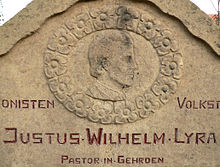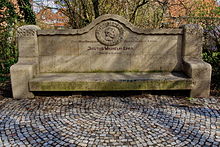Justus Wilhelm Lyra

Justus Wilhelm Lyra (born March 23, 1822 in Osnabrück , † December 30, 1882 in Gehrden ) was a German composer and later Lutheran pastor who composed the melody for Emanuel Geibel's poem May has come in 1842 .
life and work
Lyra was the son of the registrar and linguist Friedrich Wilhelm Lyra (1794-1848). Composing at an early age, he went to Berlin University to study philology and music in 1841 . In 1842, together with Rudolf Löwenstein and Hermann Schauenburg, he developed the plan for the songbook German songs and their melodies , which was published in Leipzig in 1843. In addition to May has come, there are other melodies that were widely used as student songs, such as Between France and the Bohemian Forest , My Mus' went to the tavern's house , The anxious night is now around , Through fields and beech halls , It seemed so golden the stars (after Joseph von Eichendorff ), there was someone who was touched and once upon a time there was a king . Later, German songs and their melodies became the template for the Allgemeine Deutsche Kommersbuch .
In 1843 he went to the University of Bonn . Here he was a member of the early fraternity community Knorschia Bonn (later Fridericia , dissolved in 1847) and founded the Academic Sängerkranz Bonn in it.
In Bonn Lyra switched to Protestant theology , also influenced by the sermons of the mediation theologian Karl Immanuel Nitzsch , and continued his studies in Berlin and Göttingen . However, due to family and health problems, he came into the ministry late. He also studied Sanskrit and Indian religious philosophies and wrote a three-volume work entitled Devatta for a prize assignment on the Vedanta system as religion and philosophy .
After a short period in office in Lingen and as a hospital chaplain in Langensalza , Lyra became pastor in Wittingen in 1867 , in Bevensen in 1869 and in Gehrden in 1877 , where he died in 1882 as pastor primarius .
Another major work of Lyra is his Christmas cantata based on texts by Matthias Claudius .
A sister of Justus Wilhelm Lyra was Marie Auguste Adelgunde, who was married to the painter Gustav Adolf Koettgen .
Commemoration
To commemorate Lyra, the Lyra bench was set up in Gehrden, his last place of office and death . It was initially on the edge of the Köthnerberg near the Waldschlösschen excursion restaurant and offered a view of the town center. It has been standing in the churchyard of the Margaret Church since the 1990s .
On April 30, 1905, a monument designed by Rudolf Wulfertange was placed in Osnabrück for Lyra .
In Lyra's birthplace Osnabrück, in Gehrden as the place of death and in Lübeck , the birthplace of the lyricist Emanuel Geibel, May has come is sung publicly on the eve of May 1st to this day, as well as during May singing in some university towns .
Works
- German songs and their melodies . 1843 ( digitized version of the Duchess Anna Amalia Library )
- The liturgical altar tunes of the main Lutheran worship service. 1873
- Andreas Ornitoparchus and his teaching about the church accents ... 1877
- Of the Church and its Self-Preservation in the Present Time. 1875
- On the trust of the groom and the bride. 1875
- The doctrine of the ultimate things. 1880
- On the older history of the parish of Gehrden.
Posthumous collections
- German wise men by Justus W. Lyra. 5 booklets, Leipzig: Breitkopf & Härtel
- Twelve little motets. Edited by the Church Association of the Province of Hanover.
literature
- Max Bär : Lyra, Justus Wilhelm . In: Allgemeine Deutsche Biographie (ADB). Volume 52, Duncker & Humblot, Leipzig 1906, p. 144 f.
- Wilhelm Rothert : General Hannoversche Biography Volume 1: Hannoversche men and women since 1866 , Sponholtz, Hanover 1912, pp. 214-218.
- Matthias Wolfes : Justus Wilhelm Lyra. In: Biographisch-Bibliographisches Kirchenlexikon (BBKL). Volume 24, Bautz, Nordhausen 2005, ISBN 3-88309-247-9 , Sp. 1038-1040.
- Ilsetraut Lindemann: Justus Wilhelm Lyra: a life between Biedermeier and empire. Wenner, Osnabrück 1987, ISBN 3-87898-313-1 , 92 pp.
- Tobias Widmaier: May has come (2008). In: Popular and Traditional Songs. Historical-critical song lexicon of the German Folk Song Archive
- Helge Dvorak: Biographical Lexicon of the German Burschenschaft. Volume II: Artists. Winter, Heidelberg 2018, ISBN 978-3-8253-6813-5 , pp. 475-477.
Web links
- Literature by and about Justus Wilhelm Lyra in the catalog of the German National Library
- Sheet music and audio files by Justus Wilhelm Lyra in the International Music Score Library Project
- Description of Justus Wilhelm Lyra with historical postcards
Individual evidence
- ↑ Deutsche Sängerschaft-Zeitung ( Memento of the original from December 12, 2015 in the Internet Archive ) Info: The archive link was inserted automatically and has not yet been checked. Please check the original and archive link according to the instructions and then remove this notice. (PDF; 1.5 MB), issue 2/2006, p. 20, accessed on April 29, 2009
- ^ According to ADB, the manuscript is archived in the Central Mission Library in Halle.
- ↑ Edith Laudowicz: Koettgen, Marie Auguste Adelgunde, b. Lyre . ( Memento of the original from November 3, 2014 in the Internet Archive ) Info: The archive link was automatically inserted and not yet checked. Please check the original and archive link according to the instructions and then remove this notice. Bremer Frauenmuseum.de, accessed on March 22, 2016.
| personal data | |
|---|---|
| SURNAME | Lyra, Justus Wilhelm |
| BRIEF DESCRIPTION | German pastor and song writer |
| DATE OF BIRTH | March 23, 1822 |
| PLACE OF BIRTH | Osnabrück |
| DATE OF DEATH | December 30, 1882 |
| Place of death | Gehrden |


